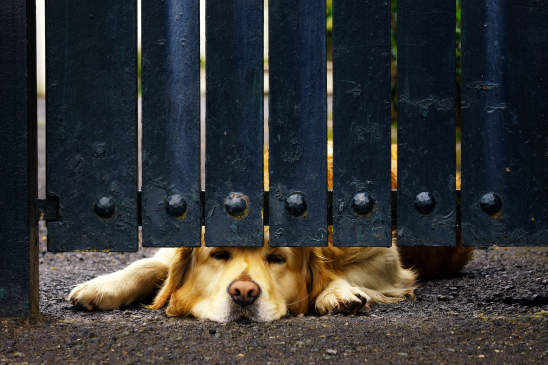We like to think our dogs are always happy and having a good time, but the reality is that, just like humans, dogs get bored sometimes. And how could they not? Many dogs, mine included, spend all day hanging around the living room watching TV or napping on the couch while their humans are at work. We’d be bored too if we had the same routine day in and day out.
But too much boredom can lead to restlessness or depression. And that’s not good for the dog either, of course. We want them to be happy and whole! “We love our dogs and want to give them a high quality of life,” says Dr. Mary R. Burch, Director of Canine Good Citizen, AKC family dog director, and a certified applied animal behaviorist. This means not letting our dogs get bored. “Boredom can lead to depression, sadness, and a dog who has behavior problems, such as destruction,” says Burch.
There are so many awesome ways to keep your pet occupied! “I often times recommend purchasing a Kong and filling it with peanut butter or Greek yogurt,” says Dr. Andrea Johnston, co-owner of Gehrman Animal Hospital. If it’s Greek yogurt, you can keep it in the freezer then give it to your pet. “That keeps them busy for hours! I also find that the dog treat balls are a great way to challenge your pet and wear them out, also while feeding them,” says Dr. Johnston. It also has the added bonus of maintaining a healthy weight for your pet. Check out what else you can do to relieve your dog's boredom below.
Engage Your Dog's Brain
A little mental stimulation goes a long way. In fact: “15 minutes of mental stimulation tires a dog as much as two hours of physical exercise,” says Johnna Devereaux, a clinical pet nutritionist. So go ahead and try some nose work (scent work using treats), puzzle toys, or teach your dog some new tricks!

Give Your Dog A Long-Term Chew
“A safe, non-rawhide chew that provides more than 10 minutes of chewing will ensure their boredom is busted!” says Devereaux.
Tire Your Dog Out
If you know you’re going to be busy for the day — take them on a nice casual walk. Give them some extra leash and let them explore and get their “sniffs” out. When dogs are allowed to periodically smell the areas in the environment, they are putting their brains to work as well as their muscles!” says Devereaux.
Play Games And Use Interactive Toys
When you are at home, you can play games with your dog such as tug games, “find it,” and hide and seek. “If you are working around the house, you can teach your dog to hold and carry to help with the laundry and yard work tasks,” says Burch. Interactive games (that you purchase for your dog) are great for when you are away and your dog may get bored while alone. These games look like puzzles and the dog works to get a hidden treat. Whatever you do, keep your dog busy. Boredom is no fun.
Keep Your Dog Socialized
Weekly visits to doggy daycare will keep your pet busy, wear them out, and help continue to develop their socialization skills. However: “It’s important to provide “downtime” for your pet so they aren’t feeling overstimulated as that’s usually when they get naughty!” says Dr. Johnston.

Create A Dog-Approved Schedule
“The best way to keep your dog mentally stimulated and active is to create a rotating enrichment activity schedule!” suggests Aubrey Sanders, Certified Professional Dog Trainer and Area Services Manager and Head of Dog Training at Wag Hotels. Give your pup something fun to do and discover each day. For example:
Monday: Eat meals out of a frozen kong day. Tuesday: Trick training day (Have three 10-minute trick training sessions at different times of the day, such as morning, afternoon, evening). Wednesday: Have an extra-long dog park day or take an extra-long hike. Thursday: Sniff-and-seek (treat puzzles) day. Friday: Trick training day. Saturday: Field trip day. Take your pup to a dog-friendly restaurant or café and work on down-stays or sit-stays. Sunday: Play day! Arrange a play-date with a neighbor or friend's dog.
Activities to choose from are totally up to you, and you can remove an activity out of rotation for a prolonged period of time if it is not working for your pup any longer. Listen to your dog. “If they are eliciting self-destructive behaviors or house destructive behaviors on certain activity days, maybe that activity isn't enough — time to change it up or add a more stimulating activity on that day!” says Sanders.
If The Problem Persists, Talk To A Vet
Sometimes what we interpret as boredom can actually be something else going on. “If your dog suffers from isolation anxiety, you will need guidance from a professional dog trainer that specializes in separation anxiety as an enrichment activity schedule alone will not work!” says Sanders. Any destructive behaviors could be stemming from factors other than boredom. “While working with a trainer, it's never a bad idea to have your dog enjoy doggy daycare on days you need to be out of the house for extended periods of time so you don't lose any progress you have made with your dog,” says Sanders.
But, try not to overthink it… a healthy amount of boredom is good! “You don’t want to feel like you need to constantly entertain your pet and that they can find ways to entertain themselves,” says Dr. Johnston.
